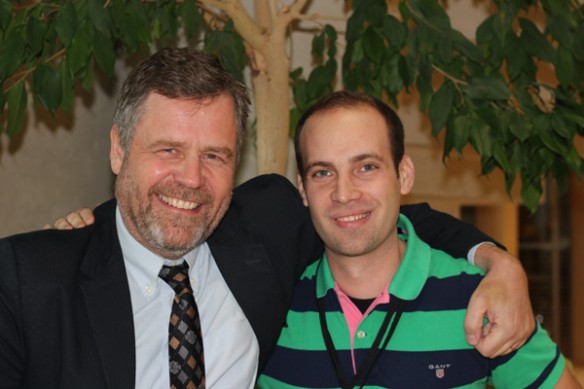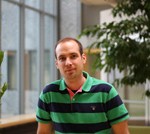
University of Helsinki has a world-class learning environment – the best labs and stimulating learning spaces in worldwide. Because our teaching staff is involved in research, you will get access to the most innovating and frontline research findings in our master’s programmes. Also, many of our students want to continue with PhD after graduation. One of them is Alexis Nathanail, who studied in The MScFood programme. Now he is doing his PhD for the Finnish Food Safety Authority Evira. We met Alexis and his supervisor professor Kimmo Peltonen at Evira.

Hi, Alexis. You studied at University of Helsinki in the master’s programme of Food Sciences. That must have been very stimulating?
Studying in the MScFood programme has been a truly amazing experience for me and has fundamentally contributed to my education as well as career development. MScFood is a relatively new international master’s programme that attracts scientists with diverse backgrounds from all around the world. I am fascinated by the fact that even though the programme is based on a solid foundation of expertise and profound reputation, it is constantly evolving to address new challenges within the fields of food safety and food manufacturing processes. MScFood provides a large number of options in terms of employment prospects, and personally I would say it has played a pivotal role in initiating my career as a researcher.
You made your master’s thesis for governmental organisation Evira. What kind of process was that?
I worked on my thesis at the Chemistry and Toxicology Research Unit of Evira. Evira offered me a really exciting topic in the field of toxicology. Most importantly, Evira granted me the opportunity to actively participate in many aspects of the project, from its designing stage all the way to result publishing. The experimental part of my master’s thesis consisted of various tasks such as method development and validation, the analysis of samples, and data processing. I was trained by Evira’s staff on the use of modern instrumentation in analytical procedures and on laboratory practices applied by accredited labs worldwide; both valuable attributes for my future endeavours as a researcher.
That sounds great. What kinds of plans do you have in the near future here in Finland?
Since the beginning of 2012, I have been working on a TEKES-funded research project involving Evira, VTT, the University of Helsinki, the Finnish Customs Laboratory and partners from the private sector. This project is called Myco-DETECT and is part of my Ph.D. work that aims to develop improved analytical tools for the detection of mycotoxins and their masked forms as well as to investigate their toxicological significance. Most of my work will take place in Evira’s laboratory facilities in Helsinki, but there are also plans for collaboration with world-renowned research groups in Europe and the USA.
Do you think that the master’s programme gave you skills you need in working life in Finland?
It sure did. In my opinion, the knowledge and skills we obtained as students at the MScFood programme are applicable not only in Finland, but also in any corresponding positions in the world. Because of the programme’s structure, which consists of theoretical and laboratory courses, students are able to develop or improve an arsenal of skills necessary in most work places related to food sciences. Moreover, during the practical training part of the programme, students have the chance to become familiar with Finnish working conditions prior to graduation.
Ok, the last question: what motivated you in your studies? Can you give any good tips? Thanks Alexis, we all wish you good luck with your PhD!
For me, probably the greatest feature of the education system is the flexibility students are given to customise their studies according to their interests, needs, and even timetables. The plethora of inspiring courses, the high quality of teaching as well as the rapid and direct communication between lecturers/professors and students, are factors that can motivate anyone to excel in their studies. Some small tips I found useful during my studies, were to keep discovering and embracing the possibilities available, never hesitating to contact people at the university for advice or feedback, and last but not least, having fun and enjoying student life!

Kimmo Peltonen, you are professor and head of Chemistry and Toxicology Research Unit in the Finnish Food Safety Authority Evira. Tell us, what are Evira’s tasks?
Activities at Evira aim at ensuring food safety, promoting animal health and welfare, and developing the prerequisites for plant and animal production as well as plant health.
What kind of cooperation possibilities you have with our students?
We have annually 30 to 40 university trainees from various disciplines. Along with that the Research department has several PhD and MSc student hired using external research funds. Usually, trainees and students have studied chemistry, food chemistry and microbiology and so forth.
What kind of work skills and expertise you expect from the students?
For me, one of the most important skills is good language skills, in other words, fluent written and spoken English. Because we are a laboratory department, the students need to have good laboratory skills as well. So far the ICT skills have not been a problem. Of course one must to be enthusiastically interested in science.
What motivates a good researcher?
A good scientist needs to be a curious person and not to be afraid of hard work!
Thank you! As the last thing, is there any interesting research going on at Evira that you would like to tell us about?
If you are interested in science and research opportunities please feel free to contact any of the eight professors who are heading the research units at Evira.
Read more: Finnish Food Safety Authority Evira
